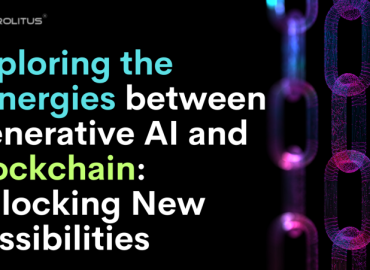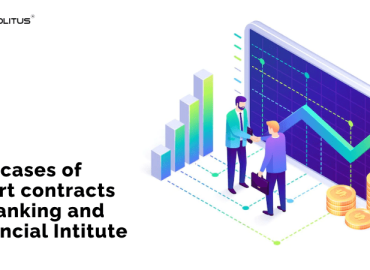In the rapidly evolving world of blockchain technology, smart contracts have emerged as powerful tools that enable secure and decentralized transactions. These self-executing contracts have revolutionized various industries, bringing efficiency, transparency, and trust to the forefront. If you want to explore the realm of smart contracts, we’ve curated a comprehensive list of the top smart contracts you need to know. This compilation showcases the most innovative and impactful smart contracts in the blockchain ecosystem, covering a wide range of applications, from finance and supply chain management to healthcare and gaming. Join us on this journey as we delve into the fascinating world of smart contracts and discover the leading solutions shaping the future of decentralized systems.
What exactly are smart contracts?
Smart contracts are a groundbreaking layer of blockchain technology that allows users to interact and transact with one another via a ‘robotic intermediary.” A smart contract can be thought of as a self-executing pile of code that can perform specific actions that would normally have to be performed manually.
- Smart contracts have a huge impact. DeFi Developers often use them to automate cool features like flash loans, standard loans, staking, and more.
- They can, however, automate tasks and host decentralized applications in addition to providing trust.
- Many smart contract cryptocurrencies are competing for developer attention and critical projects. It is unclear which cryptocurrency will triumph in this battle of blockchains.
- There are so many contenders, and any of them could be eliminated by a major technical issue or security flaw. Anyway, here is a list of smart contracts to watch for in 2022.
Ethereum
Ethereum is well-known for being one of the first cryptocurrencies to implement smart contracts on its network. But the cryptocurrency has some problems that will be fixed by ETH 2.0, a newer and better version. This makes the coming year very important.
- It was the first cryptocurrency to implement smart contracts. As a result, it powers the vast majority of applications. According to the State of the dApps, Ethereum’s network hosts approximately 80% of DeFi applications.
- This cryptocurrency has some flaws that will be resolved by a more updated and efficient version of it. But until ETH 2.0 is released, it gives its competitors a lot of time to work on and release more advanced versions of smart contracts to attract more customers.
Polkadot
The Polkadot blockchain network was created by the software development company Parity Technologies. It is currently the fifth-largest crypto project by market cap. It is also backed by the Web3 Foundation, which is a group of people who all want to build a decentralized web.
- Polkadot is well-known for hosting parachains on its blockchain network. This means that the platform can run multiple chains within an existing blockchain, which is known as sharding. Polkadot employs a technique known as parachains.
- These operate in parallel with the main blockchain and allow it to process transactions more quickly. Smart contracts operate on parachains rather than the main blockchain.
- To process transactions faster, it employs parachains that run in parallel to the main blockchain. However, when it comes to DOT, smart contracts run on parachains rather than the main blockchain.
Solana
Solana is one of the best-performing cryptocurrencies in 2021. With a price increase of over 11,000%, it jumped from 120th place at the start of 2021 to fifth place by the end of the year. Solana is currently the fastest cryptocurrency on the market, with a transaction rate of 50,000 transactions per second.
- Aside from that, investors are drawn to SOL for a variety of other reasons. It employs the proof-of-history consensus algorithm, which allows it to process transactions even faster.
- Because projects are an important part of investors’ trust in cryptocurrencies, SOL has quickly acquired several projects and now has over 400 projects on its network.
- It can process between 50,000 and 65,000 transactions per second (TPS), compared to 15 to 45 TPS for Ethereum. According to its website, the average cost per transaction is 0.00025. Its ecosystem also includes over 1,000 projects.
Cardano
Cardano is on a different path than other cryptocurrencies. It takes a systematic approach to development, preferring to peer review and thoroughly test new features before releasing them. As a result, smart contracts were only introduced in September. Even so, Cardano was criticized on social media by people who said it hadn’t done everything it said it would.
- Cardano is a relative newcomer to the smart contract race. The crypto industry prefers the most recent technological advancements and peer-reviewed processes, so development is slow and steady.
- This means that the majority of its processes take a long time to implement; several community members decided to launch it after years of research.
Avalanche
According to Avalanche, it is the fastest smart contract platform in terms of finality, surpassing even Solana. It accomplishes this by utilizing three different blockchains on its system while also keeping fees low and the platform scalable.
- According to DeFi Llama, Avalanche’s platform currently has more value locked in than Solana’s.
- Avalanche is currently regarded as one of the cryptocurrency market’s rising stars. It is the blockchain industry’s fastest smart contract platform in terms of time-to-finality.
- It is highly flexible, has low transaction fees, and is environmentally friendly. The AVAX token has a hard cap and can be used as a payment method.
Algorand
Algorand’ blockchain-based network is independent, decentralized, and supports a wide range of applications. It is also one of the newest smart contract platforms, promising low costs, scalability, and speed without sacrificing security.
- Alogorand, like the other new smart contract platforms, promises low costs, scalability, and speed without sacrificing security.
- Algorand smart contracts can be written in a variety of programming languages by developers. Clarity, for example, is intended to make it simple for users to understand what the contract will do, even if they are not seasoned developers.
Cosmos
Cosmos is focused on interoperability, or ensuring that different blockchains can communicate with one another. Interoperability becomes more important as people use multiple smart contract networks. Cosmos wants to create an ecosystem of blockchains that can talk to each other instead of separate silos that can’t exist together.
- Cosmos focuses on interoperability, which ensures that different blockchains can communicate with one another.
- It positions itself as a project that addresses some of the most complex issues confronting the blockchain industry today. One of the other goals is to make blockchain technology easier for developers to use when making frameworks for decentralized apps.
Unlock the Power of Smart Contracts with Prolitus
Are you looking to use blockchain technology’s power to create a more secure, transparent, and efficient business environment? If so, you need a team of experts to help you develop smart contracts to achieve your goals.
That’s where Prolitus comes in. We are a leading provider of blockchain solutions, and we have a team of experienced developers who specialize in smart contract development tailored to our client’s unique needs. Our team has a deep understanding of blockchain technology, and we use the latest tools and techniques to develop smart contracts that are secure, efficient, and reliable.
When you work with Prolitus, you can expect the highest level of professionalism and expertise. We take the time to understand your business and goals, and we work closely with you throughout the development process to ensure that your smart contract meets your specific needs. We also provide ongoing support and maintenance to ensure your smart contract continues functioning as intended.
So if you’re looking for a partner who can help you harness the power of blockchain technology, look no further than Prolitus. Contact us today to learn more about how we can help you develop smart contracts that will take your business to the next level.
Final Thoughts
In conclusion, as we move ahead in 2023, the world of smart contracts continues to evolve rapidly, paving the way for decentralized innovation across various industries. The top 10 smart contract platforms highlighted in this article represent the pinnacle of technological advancements. They are at the forefront of transforming how we conduct business, govern systems, and interact with digital assets. With their robust features, scalability, interoperability, and diverse applications, these platforms offer unparalleled opportunities for developers, enterprises, and individuals to harness the power of blockchain technology. Therefore, as we move forward, it’s crucial to stay informed and embrace the potential of these smart contract platforms to shape a more efficient, transparent, and decentralized future.
FAQs
What Is The Best Blockchain For Smart Contracts, And Why?
Determining the best blockchain for smart contracts depends on various factors, including scalability, security, developer community, and ecosystem support. Ethereum remains popular due to its pioneering role in introducing smart contracts and its vast network effect. Furthermore, its solidity programming language and extensive tooling ecosystem make it a developer-friendly platform. Additionally, Ethereum's large user base and wide range of decentralized applications (DApps) provide ample opportunities for innovation and collaboration. However, other blockchains like Binance Smart Chain and Solana are gaining traction for their high throughput, low transaction fees, and growing developer communities. Ultimately, the best blockchain for smart contracts depends on specific requirements, emphasizing the need for careful evaluation and consideration of each platform's strengths and weaknesses.
How many types of smart contracts are there?
There are three classifications of contracts that utilize blockchain technology: Smart Legal Contracts, Decentralized Autonomous Organizations (DAOs), and Application Logic Contracts. These types of contracts enable automated and decentralized execution of agreements, the operation of decentralized organizations, and the implementation of application-specific logic, respectively.





